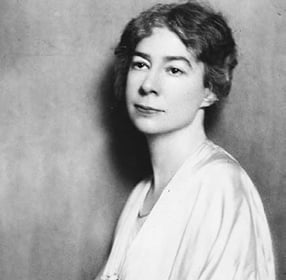Sappho
The twilight’s inner flame grows blue and deep,
And in my Lesbos, over leagues of sea,
The temples glimmer moonwise in the trees.
Twilight has veiled the little flower face
Here on my heart, but still the night is kind
And leaves her warm sweet weight against my breast.
Am I that Sappho who would run at dusk
Along the surges creeping up the shore
When tides came in to ease the hungry beach,
And running, running, till the night was black,
Would fall forespent upon the chilly sand
And quiver with the winds from off the sea?
Ah, quietly the shingle waits the tides
Whose waves are stinging kisses, but to me
Love brought no peace, nor darkness any rest.
I crept and touched the foam with fevered hands
And cried to Love, from whom the sea is sweet,
From whom the sea is bitterer than death.
Ah, Aphrodite, if I sing no more
To thee, God’s daughter, powerful as God,
It is that thou hast made my life too sweet
To hold the added sweetness of a song.
There is a quiet at the heart of love,
And I have pierced the pain and come to peace.
I hold my peace, my Cleïs, on my heart;
And softer than a little wild bird’s wing
Are kisses that she pours upon my mouth.
Ah, never any more when spring like fire
Will flicker in the newly opened leaves,
Shall I steal forth to seek for solitude
Beyond the lure of light Alcæus’ lyre,
Beyond the sob that stilled Erinna’s voice.
Ah, never with a throat that aches with song,
Beneath the white uncaring sky of spring,
Shall I go forth to hide awhile from Love
The quiver and the crying of my heart.
Still I remember how I strove to flee
The love-note of the birds, and bowed my head
To hurry faster, but upon the ground
I saw two wingèd shadows side by side,
And all the world’s spring passion stifled me.
Ah, Love, there is no fleeing from thy might,
No lonely place where thou hast never trod,
No desert thou hast left uncarpeted
With flowers that spring beneath thy perfect feet.
In many guises didst thou come to me;
I saw thee by the maidens while they danced,
Phaon allured me with a look of thine,
In Anactoria I knew thy grace,
I looked at Cercolas and saw thine eyes;
But never wholly, soul and body mine,
Didst thou bid any love me as I loved.
Now I have found the peace that fled from me;
Close, close, against my heart I hold my world.
Ah, Love that made my life a lyric cry,
Ah, Love that tuned my lips to lyres of thine,
I taught the world thy music, now alone
I sing for one who falls asleep to hear.
This poem is in the public domain. Published in Poem-a-Day on June 4, 2023, by the Academy of American Poets.
“Sappho” first appeared in Sara Teasdale’s collection Helen of Troy and Other Poems (G. P. Putnam’s Sons, 1911), and later again as the third section of an expanded version of the poem included in her collection Rivers to the Sea (The Macmillan Company, 1926). The poem, like several others included in Helen of Troy and Other Poems, is a dramatic monologue composed in lines of blank verse. In The New Era in American Poetry (Henry Holt and Company, 1919), Louis Untermeyer writes that the poem “is made to live in a blank verse so musical that it has an almost lyric intensity. Classical in subject, the treatment is as modern and searching as any of [James] Oppenheim’s analytic probings; the figures are vitalized by a new interpretation that is as penetrating as it is passionate. The picture of Sappho grown old, singing her little daughter to sleep and dreaming of her old loves and Lesbos, is unusual and unforgettable—particularly in its half-pathetic, half-ironic ending [. . .].”

